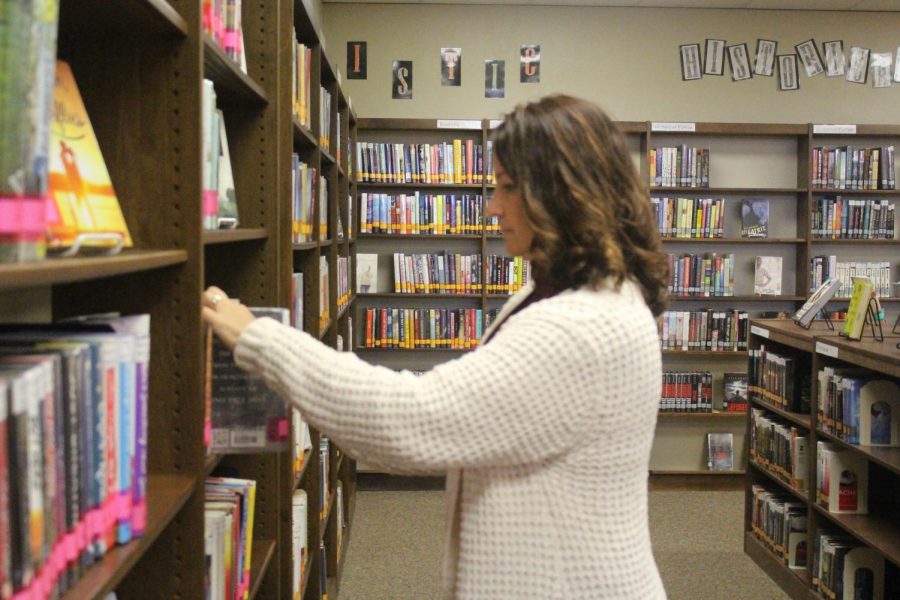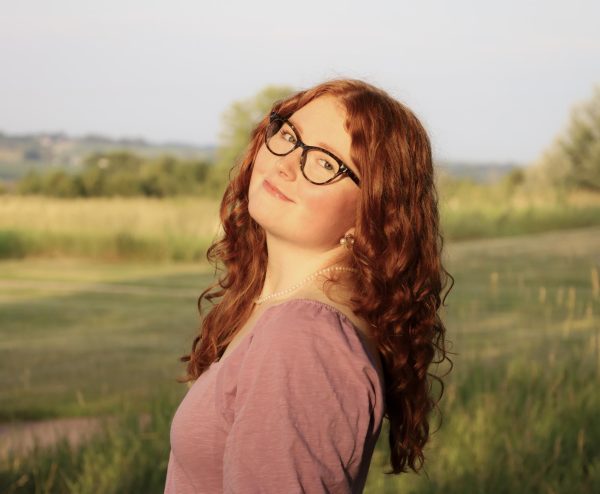Librarians feel the pressure of an increase in book challenges
LHS librarian Mary Peters has handled multiple inquiries concerning library book content, yet she still tries to provide a variety of books that represent the full student body.
March 9, 2023
On Jan. 26, 2023, South Dakota House Bill 1163 was first introduced. The bill, which was killed on Feb. 8, proposed to “prohibit the dissemination of obscene material to minors in a public school or public library,” thus feeding into the nationwide increase in proposed legislation regarding banned books.
On top of this, the American Library Association documented 681 attempts to ban or limit library resources between Jan. 1 and Aug. 31, 2022, nationally. These challenges were reported to have affected 1,651 different books, an increase from 2021.
As discussion of book challenges becomes a more prevalent topic on both a nationwide and statewide level, LHS librarian Mary Peters feels more pressure to limit the amount of potentially controversial books on the shelves of her library.
“Sometimes I feel a little bit under attack. ‘What if I order a book and somebody doesn’t like it?’ So, I take even more time to read reviews,” said Peters. “It just makes it hard, there are times I feel I am not doing a good job because I might be attacked for something that I feel is the right thing.”
The Sioux Falls School District has a set policy to follow whenever a parent challenges a book offered within the library, giving guidelines for librarians to refer parents to if there are any complaints. While not all libraries within the district have the same books on their shelves, books can be shifted from school to school if requested. Consequently, when a book is challenged at one school, people from the entire district get involved.
“The parents have to formally file a written complaint, fill out the form and then it goes to a committee. The committee consists of a librarian in the district, a principal from one of the schools in the district and it has to have teachers, students and parents from the district,” said Peters. “The committee reads the whole book, then they read the official challenge and they decide whether or not the book is going to stay on the shelf.”
Despite the heightened probability of complaints from parents, Peters still feels an obligation to provide a variety of books so all of the student body feels represented.
“I feel strongly that since we are a public system, I have to provide books for all students. I understand that is hard for some parents because they might not want their child reading a certain item. I truly understand that is their decision to make, and I completely respect their decision and will follow their guidelines for their students, but I also still feel like books need to stay on the shelves because there are students that need certain types of books,” said Peters.
Other than filing complaints that could completely ban titles from all school district shelves, parents can tell librarians that they do not want their children reading certain books. Peters prefers this method because she believes that other students should have the ability to read them.
“As a parent, you have that choice to make for your child,” said Peters. “But if you challenge a book and want it removed, you’re taking away something from another child that might need it. You are censoring something that might have a valuable lesson for someone else.”
The discussion around potentially controversial topics is constantly shifting, so Peters finds that her job responsibilities and experiences are ever-changing. Now, she has to adapt to the looming possibility that a book gets complained about on social media before she becomes aware of the complaint.
“I love my job, but with every year it is a new challenge,” said Peters. “I just wish that if a parent had a concern, they would come to me, or whatever librarian is in their child’s school, before they just put it out on social media.”
Sarah Becker, a librarian at Jane Addams Elementary and Hawthorne Elementary in the district, views the conversation around banned books as not a completely new topic, but rather a culturally shifting one.
“Throughout history, being a librarian has always been hard because there have always been banned books. There has always been censorship. The topic changes based on the times and what is prevalent in culture,” said Becker.
While elementary schools often have fewer possibly controversial books, children are still developing their own identities. Becker sees the lack of books about certain topics, because of their potential for pushback, as a barrier for some students to find representation.
“Queer students are definitely targeted more because books about queer students are the topics that are challenged the most. I also feel like students of color can be disproportionately affected,” said Becker.
As polarizing as certain topics can be, Becker wants to display all types of opinions and stories in libraries in hopes that will bring more people together rather than divide them further.
“When you take away certain stories, then one narrative starts to become prevalent. Then you stop having the hard conversations that move culture forward,” said Becker. “Plurality is really important.”
Becker thinks that HB 1163 and the similar Senate Bill 193 did not pass because there is not a clear way to classify whether a book contains “obscene” material, thus making it hard to implement them as laws.
“Obscene is a very subjective word, and people have their own definitions of what that means. That’s why I think [HB 1163] has had trouble. How do you legislate people’s thoughts and feelings?” said Becker.
Even in the wake of these bills and growing trends of increased book challenges, Becker views her job as a librarian to present every story and push the world towards an understanding future.
“I feel like librarians do a really hard job. People often think that you just get to read books all the time, but having those hard moral conversations is something that most librarians go into librarianship for,” said Becker. “Librarians are here to keep society moving forward; we want people to feel heard and for everyone’s story to be told.”










